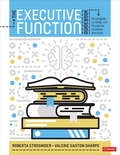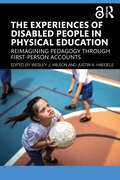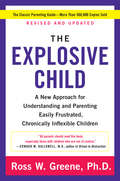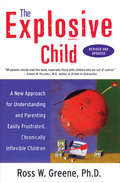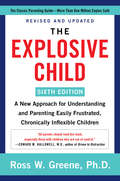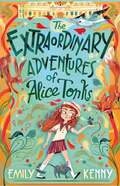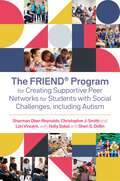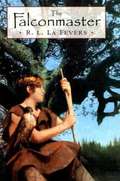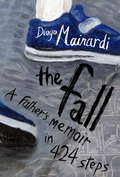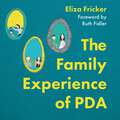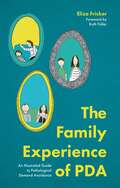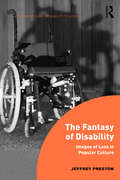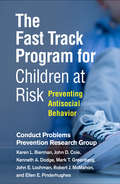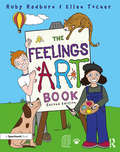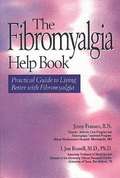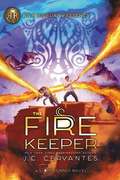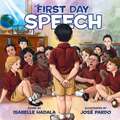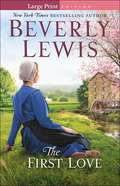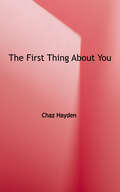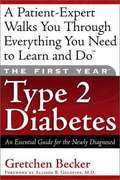- Table View
- List View
The Executive Function Guidebook: Strategies to Help All Students Achieve Success
by Roberta I. Strosnider Valerie Saxton SharpeTeach some of the most important skills your students will ever need! Executive function skills—including self-regulation, focus, planning, and time-management—are essential to student success, but they must be taught and practiced. This unique guidebook provides a flexible seven-step model, incorporating UDL principles and the use of metacognition, for making executive-function training part of your classroom routine at any grade level. Features include: Descriptions of each skill and its impact on learning Examples of instructional steps to assist students as they set goals and work to achieve success. Strategies coded by competency and age/grade level Authentic snapshots and “think about” sections Templates for personalized goal-setting, data collection, and success plans Accompanying strategy cards
The Experiences of Disabled People in Physical Education: Reimagining Pedagogy through First-Person Accounts
by Justin A. Haegele Wesley J. WilsonBringing together a set of first-person accounts of physical education from the perspectives of disabled children and adults, this book puts disabled people’s voices in the foreground.The book provides a rich set of case study material that deepens our understanding of the experiences of disabled people and challenges students, researchers, and practitioners to reflect critically upon their own positionality. The first part of the book discusses the ways in which disability has been conceptualized, how the voices of disabled people have sometimes been marginalized, and how nondisability power has historically framed the narratives of disabled people in physical education literature. It also discusses the innovative methods used in this book—such as storytelling through recorded conversations and drawings in addition to more traditional chapter writing—to empower disabled children and adults to act as authors of their own stories. Then the book presents the stories themselves in a variety of written, narrative, and alternative formats, a series of authentic accounts of the lived experiences of disabled people in physical education. Finally, the book concludes with the editors’ final thoughts and reflections about this collection of stories that can be used in the classroom to foster dialogue and encourage critical thinking. Importantly, these prompts have been co-constructed between the editors and the disabled people themselves.This book is essential reading for any course in adapted physical education, physical education, or disability, for any pre- or in-service teacher, instructor, or coach working with disabled people, and for people who experience disability or their families with an interest in education, physical activity, or methods for elevating the voices of disabled people.
The Explosive Child
by Ross W. GreeneScreaming, swearing, crying, hitting, kicking, spitting, biting...these are some of the challenging behaviors we see in kids who are having difficulty meeting our expectations. These behaviors often leave parents feeling frustrated, angry, overwhelmed, and desperate for answers. In this fully revised and updated book, Dr. Ross Greene helps you understand why and when your child does these things and how to respond in ways that are nonpunitive, nonadversarial, humane, and effective.Dr. Greene describes how best to: Understand the factors that contribute to challenging episodes. Identify the specific situations in which challenging episodes are likely to occur. Reduce or eliminate challenging episodes by solving the problems that cause them. Solve problems collaboratively (rather than unilaterally) and proactively (rather than reactively). Help your child develop the skills to be more flexible, solve problems, and handle frustration more adaptively. Reduce hostility and antagonism between you and your child.With Dr. Greene's practical, expert guidance, you and your child will forge a new relationship based on communication and mutual respect.
The Explosive Child
by Ross W. GreeneWhat's an explosive child? A child who responds to routine problems with extreme frustration-crying, screaming, swearing, kicking, hitting, biting, spitting, destroying property, and worse. A child whose frequent, severe outbursts leave his or her parents feeling frustrated, scared, worried, and desperate for help. Most of these parents have tried everything-reasoning, explaining, punishing, sticker charts, therapy, medication-but to no avail. They can't figure out why their child acts the way he or she does; they wonder why the strategies that work for other kids don't work for theirs; and they don't know what to do instead. Dr. Ross Greene, a distinguished clinician and pioneer in the treatment of kids with social, emotional, and behavioral challenges, has worked with thousands of explosive children, and he has good news: these kids aren't attention-seeking, manipulative, or unmotivated, and their parents aren't passive, permissive pushovers. Rather, explosive kids are lacking some crucial skills in the domains of flexibility/adaptability, frustration tolerance, and problem solving, and they require a different approach to parenting. Throughout this compassionate, insightful, and practical book, Dr. Greene provides a new conceptual framework for understanding their difficulties, based on research in the neurosciences. He explains why traditional parenting and treatment often don't work with these children, and he describes what to do instead. Instead of relying on rewarding and punishing, Dr. Greene's Collaborative Problem Solving model promotes working with explosive children to solve the problems that precipitate explosive episodes, and teaching these kids the skills they lack.
The Explosive Child [Sixth Edition]: A New Approach for Understanding and Parenting Easily Frustrated, Chronically Inflexible Children
by Ross W Greene PhDNow in a revised and updated 6th edition, the groundbreaking, research-based approach to understanding and parenting children who frequently exhibit severe fits of temper and other challenging behaviors, from a distinguished clinician and pioneer in the field.What’s an explosive child? A child who responds to routine problems with extreme frustration—crying, screaming, swearing, kicking, hitting, biting, spitting, destroying property, and worse. A child whose frequent, severe outbursts leave his or her parents feeling frustrated, scared, worried, and desperate for help. Most of these parents have tried everything-reasoning, explaining, punishing, sticker charts, therapy, medication—but to no avail. They can’t figure out why their child acts the way he or she does; they wonder why the strategies that work for other kids don’t work for theirs; and they don’t know what to do instead.Dr. Ross Greene, a distinguished clinician and pioneer in the treatment of kids with social, emotional, and behavioral challenges, has worked with thousands of explosive children, and he has good news: these kids aren’t attention-seeking, manipulative, or unmotivated, and their parents aren’t passive, permissive pushovers. Rather, explosive kids are lacking some crucial skills in the domains of flexibility/adaptability, frustration tolerance, and problem solving, and they require a different approach to parenting. Throughout this compassionate, insightful, and practical book, Dr. Greene provides a new conceptual framework for understanding their difficulties, based on research in the neurosciences. He explains why traditional parenting and treatment often don’t work with these children, and he describes what to do instead. Instead of relying on rewarding and punishing, Dr. Greene’s Collaborative Problem Solving model promotes working with explosive children to solve the problems that precipitate explosive episodes, and teaching these kids the skills they lack.
The Explosive Child: A New Approach for Understanding and Parenting Easily Frustrated, "Chronically Inflexible" Children
by Ross W. GreeneWhat's an explosive child? A child who responds to routine problems with extreme frustration-crying, screaming, swearing, kicking, hitting, biting, spitting, destroying property, and worse. A child whose frequent, severe outbursts leave his or her parents feeling frustrated, scared, worried, and desperate for help. Most of these parents have tried everything--reasoning, explaining, punishing, sticker charts, therapy, medication-- but to no avail. They can't figure out why their child acts the way he or she does; they wonder why the strategies that work for other kids don't work for theirs; and they don't know what to do instead. Dr. Ross Greene, a distinguished clinician and pioneer in the treatment of kids with social, emotional, and behavioral challenges, has worked with thousands of explosive children, and he has good news: these kids aren't attention-seeking, manipulative, or unmotivated, and their parents aren't passive, permissive pushovers. Rather, explosive kids are lacking some crucial skills in the domains of flexibility/adaptability, frustration tolerance, and problem solving, and they require a different approach to parenting. Throughout this compassionate, insightful, and practical book, Dr. Greene provides a new conceptual framework for understanding their difficulties, based on research in the neurosciences. He explains why traditional parenting and treatment often don't work with these children, and he describes what to do instead. Instead of relying on rewarding and punishing, Dr. Greene's Collaborative Problem Solving model promotes working with explosive children to solve the problems that precipitate explosive episodes, and teaching these kids the skills they lack.
The Extraordinary Adventures of Alice Tonks: Longlisted for the Adrien Prize, 2022 (The Extraordinary Adventures of Alice Tonks #1)
by Emily Kenny&“Has heart, soul and so much spirit.&” Lindsay Galvin, author of Darwin&’s Dragons &“Disappearing animals, twists and turns, and an amazing autistic protagonist.&” Rashmi Sirdeshpande, author of Dosh &“Exciting, deftly plotted and full of surprises.&” Sinéad O'Hart, author of The Eye of the North Alice Tonks would love to make friends at boarding school. And, being autistic, she just wants people to accept her for who she is. But after a rather strange encounter with a talking seagull on her first day, she suddenly has a new challenge and a lot of questions. Animals are going missing and Alice can&’t solve the mystery alone. With new friends behind her, can Alice harness her magic powers and become the hero she never imagined? A story about finding your voice, friendship and unlikely heroes, for fans of A Kind of Spark
The Eyes That Lead: The Story of Guide Dogs for the Blind
by Michael Tucker"For anyone who has ever seen a guide dog working, or is in the slightest bit interested in dogs, I recommend they read this book and share in some of the delights of a guide dog-trainer and maybe glean a little of the love and understanding that's shared between blind person and guide dog. " From the foreword by Sheila Hocken, author of the bestselling Emma books. Michael Tucker, the highly successful guide-dog trainer who now runs his own school, here distills twenty years of practical experience to produce a fascinating and wide-ranging account of how both dog and owner are taught their roles. The book describes the choice of dog and the history of the breeds, and follows the arduous traffic training, obstacle tests and temperamental assessments to which each animal is subjected. The author explains the guidance given to the owner in gaining confidence in his or her new companion, from the initial meeting to the difficult road manoeuvres which must all be mastered. This unique and heartwarming study will serve to shatter the myths of the uncanny intelligence of the dogs, and for the first time will explain for the general public and for those more intimately concerned, the full story lying behind every blind person and his guide.
The FRIEND® Program for Creating Supportive Peer Networks for Students with Social Challenges, including Autism
by Christopher J. Smith Holly Sokol Sheri S. Dollin Sharman Ober-Reynolds Lori VincentFRIEND is a social, communication and play-based program to help school-aged children with social challenges. All students deserve a positive school experience where they can reach their social and academic potential. However, this can prove difficult for students with challenges such as attention deficit, anxiety, or autism spectrum disorders, who may struggle daily with social situations. This manual provides everything educators need to support these students with their social skills in everyday situations, throughout their school years. This program is designed to help any student with social challenges, no matter how subtle. For students without social challenges, it teaches tolerance, acceptance and understanding. The characteristics of successful social skills programs are described, with an emphasis on how FRIEND implements them through three key components: the Peer Sensitivity Curriculum, the FRIEND Lunch Program and the FRIEND Playground Program. These can be implemented individually or in any combination as a comprehensive program. Parents and family are offered information on working together with schools and implementing FRIEND strategies at home and in the community. Emphasizing peer sensitivity, education and a supportive environment, FRIEND is for any educator wanting to create an inclusive and safe atmosphere for students to learn social skill-building strategies.
The Face
by Angela Elwell HuntOrphaned and severely deformed, from her earliest moments Sarah Sims has been kept hidden away in a secret CIA facility until an unexpected discovery gives her an opportunity to make a life for herself at last. Now Sarah has an ally, a long-lost aunt who has discovered her true identity. Aided by this brave psychologist, twenty-year-old Sarah must find the courage to confront the forces that have confined her for so long. And the strength to be reborn into a world she has never known.
The Face of the Deep
by Jacob TwerskyThough it was published in 1953, this book is grimly relevant today. The author, who was blind himself, writes about blindness from the inside. The theme of the novel is prejudice with all its overwhelming repercussions. Twersky's blind characters all suffer its devastating effects, and it shapes every aspect of their lives. The self-hatred spawned by this prejudice spurs them to deny and denigrate one another. This is not a pretty story, though it has soaring moments, and some of the characters manage to rise above their circumstances with integrity and compassion intact.
The Falconmaster
by R. L. LaFeversThis fantasy combines wizardry and magic with an absorbing animal-rescue story and should appeal to all fantasy lovers, but especially boys. Wat, a crippled boy, is an outcast in his village and retreats often to the forest, away from the cruel taunts of the villagers. There he witnesses the lord's handlers heartlessly kill a nesting pair of falcons so they can take the baby birds for their master. Wat, outraged, steals the nestlings and escapes into the heart of the forest, where he meets a mysterious old man. He is a mage-a wizard-who teaches him many things, among them how to care for the birds so that they may eventually fly free, and how to find some helpful magic-which is closer to him than he ever believed.
The Fall
by Margaret Jull Costa Diogo MainardiTHE FALL is a memoir like no other. Its 424 short passages match the number of steps taken by Diogo Mainardi's son Tito as he walks, with great difficulty, alongside his father through the streets of Venice, the city where a medical mishap during Tito's birth left him with Cerebral Palsy. As they make their way toward the hospital where both their lives changed forever, Mainairdi begins to draw on his knowledge of art and history, seeking to better explain a tragedy that was entirely avoidable. From Marcel Proust to Neil Young, to Sigmund Freud to Humpty Dumpty, to Renaissance Venice and Auschwitz, he charts the trajectory of the Western world, with Tito at its center, showing how his fate has been shaped by the past. Told with disarming simplicity; by turns angry, joyful, and always generous, wise and suprising, THE FALL is an anstonishing book.
The Family Experience of PDA: A Guide to Pathological Demand Avoidance
by Eliza FrickerEliza Fricker gets it. Describing her perfectly imperfect experience of raising a PDA child, with societal judgements and family pressures, she knows how easy it is to feel overwhelmed, resentful and alone. The Family Experience of PDA's comedic illustrations explain these challenging situations and emotions in a way that words simply cannot, bringing some much-needed levity back into PDA parenting. Humorous anecdotes with a compassionate tone remind parents that they are not alone, and they're doing a great job. If children are safe, happy, and you leave the house on time, who cares about some smelly socks? A light-hearted and digestible guide to being a PDA parent covering everything from tolerance levels, relationships and meltdowns to collaboration, flexibility, and self care to dip in and out as your schedule allows to help get to grips with this complex condition. This book is an essential read for any parent with a PDA child, to help better understand your child, build support systems and carve out some essential self-care time guilt-free.
The Family Experience of PDA: An Illustrated Guide to Pathological Demand Avoidance
by Eliza FrickerEliza Fricker gets it. Describing her perfectly imperfect experience of raising a PDA child, with societal judgements and internal pressures, it is easy to feel overwhelmed, resentful and alone. This book's comedic illustrations explain these challenging situations and feelings in a way that words simply cannot, will bring some much-needed levity back into PDA parenting. Humorous anecdotes with a compassionate tone remind parents that they are not alone, and they're doing a great job. If children are safe, happy, and you leave the house on time, who cares about some smelly socks? A light-hearted and digestible guide to being a PDA parent covering everything from tolerance levels, relationships and meltdowns to collaboration, flexibility, and self care to dip in and out as your schedule allows to help get to grips with this complex condition. This book is an essential read for any parent with a PDA child, to help better understand your child, build support systems and carve out some essential self care time guilt free.
The Fantasy of Disability: Images of Loss in Popular Culture (Interdisciplinary Disability Studies)
by Jeffrey PrestonWhat are the unconscious fantasies circulating in representations of disability? What role do these fantasies play in defining the condition of disability? What can these fantasies teach us about human vulnerability writ large? The Fantasy of Disability explores how popular culture texts, such as Degrassi: The Next Generation and Glee, fantasize about what life with a physical disability must be like, while at the same time exerting tremendous pressure on disabled individuals to conform their identity and behaviour to fit within the margins of these societally perpetuated archetypes. Rather than merely engaging with how disability is represented, though, this text investigates how representations of disability reveal their nondisabled producers to be perpetually anxious subjects, doomed to fear not just the disabled subject but the very reality of disability lurking within. Situated at the nexus of disability studies, media studies and psychology, this text presents an innovative way of analyzing representations of disability in popular culture, inverting the psychoanalytic gaze back upon the nondisabled to investigate how disability can become a lens through which to interrogate the normate subject.
The Fast Track Program for Children at Risk: Preventing Antisocial Behavior
by Karen L. Bierman John E. Lochman Mark T. Greenberg Conduct Problems Prevention Research Group John D. Coie Kenneth A. Dodge Robert J. McMahon Ellen E. PinderhughesThis unique volume reports on the largest long-term preventive intervention study ever conducted with children at risk for serious violence and poor life outcomes. From first through 10th grade, Fast Track provided multicomponent interventions to support children, families, and schools in achieving positive social, emotional, and academic outcomes. The book explores the developmental processes associated with early aggression, describes how each component of FastTrack was developed and implemented, and summarizes outcomes up to 20 years later. Vivid case studies track the impact of comprehensive school- and family-based programming on children's pathways through the elementary and high school years. The concluding chapter offers recommendations for using Fast Track components in future violence prevention initiatives. See also the authors' Social and Emotional Skills Training for Children: The Fast Track Friendship Group Manual, a step-by-step guide to implementing one of the core components of Fast Track.
The Fastest Girl on Earth!: Meet Kitty O'Neil, Daredevil Driver!
by Dean RobbinsGear up for this high-powered picture book biography about Kitty O'Neil, the stuntwoman and racecar driver who broke the women's land speed record!Kitty O'Neil was a force to be reckoned with. She became deaf as a child, and grew up loving sports and action. Kitty jumped, ran, raced, and swam, all while learning to read lips and communicating through sign language. Eventually, Kitty took a job as a stuntwoman, doing the most dangerous job on set and even filming stunts for films like Wonder Woman! Still, Kitty wanted more thrills. She became a racecar driver and sought to do what no woman had done before. She chose the aptly named Motivator and trained like a true champion. In 1976, Kitty and the Motivator broke the land speed record, racing at over 600 miles per hour! Kitty was a hero to fans everywhere, and proved that she was truly unstoppable.
The Feelings Artbook: Promoting Emotional Literacy Through Drawing
by Ruby RadburnThis fun, imaginative book offers children a way to develop their emotional literacy skills through creativity and drawing. The new edition has been reimagined as a child-friendly activity book that can be completed independently, with beautiful new illustrations and more than ten extra activities. For professionals, the book is designed to be flexible and photocopiable, so that it can be used in a range of educational and therapeutic settings. The accompanying instructions and guidance are now available online, with a clearly stated aim for each activity, a suggested outline of how to facilitate and three optional follow-on ideas. There are now also three Monitoring and Evaluation templates included in the online booklet, one for individual work, one for group work and one for whole-class work. The resource is divided into three themed sections: • Self Esteem: Activities exploring identity, personal empowerment, aspirations and values, and important relationships in a child’s life • Emotions: In this section, children are invited to consider a range of complex feelings such as excitement, jealousy and disappointment • Empathy and Imagination: These activities guide children towards an awareness of other people’s experiences, emotions and feelings Suitable for both parents and professionals, this book is an invaluable resource for anybody looking to improve the emotional awareness and wellbeing of young people.
The Fibromyalgia Help Book: Practical Guide To Living Better With Fibromyalgia
by Jenny Fransen I. John RussellFibromyalgia: the most common cause of widespread pain. Over 5 million Americans - mostly women - suffer from fibromyalgia, an invisible disorder that causes chronic muscle pain, fatigue, memory problems, lack of concentration, and numerous secondary symptoms. Recent research is finally revealing what causes this mysterious condition and is developing more effective treatment. The Fibromyalgia Help Book is a how-to guide that gives people with fibromyalgia practical tools for effectively managing the syndrome. Recommended for fibromyalgia patients, medical professionals who treat fibromyalgia, those seeking to understand fibromyalgia sufferers, and FMS support groups.
The Fire Keeper (Storm Runner #2)
by J. C. Cervantes Irvin RodriguezZane Obispo's new life on a beautiful secluded tropical island, complete with his family and closest friends, should be perfect. But he can't control his newfound fire skills yet (inherited from his father, the Maya god Hurakan); there's a painful rift between him and his dog ever since she became a hell hound; and he doesn't know what to do with his feelings for Brooks. One day he discovers that by writing the book about his misadventures with the Maya gods, he unintentionally put other godborn children at risk. Unless Zane can find the godborns before the gods do, they will be killed. To make matters worse, Zane learns that Hurakan is scheduled to be executed. Zane knows he must rescue him, no matter the cost. Can he accomplish both tasks without the gods detecting him, or will he end up a permanent resident of the underworld? In this cleverly plotted sequel to The Storm Runner, the gang is back together again with spirited new characters, sneaky gods, Aztec royalty, unlikely alliances, and secrets darker than Zane could ever have imagined. Secrets that will change him forever.
The First Day Speech
by Isabelle HadalaNathan is excited about finally being old enough to go to school, but what will the first day be like? Who will be his friend? He also has a special worry: will the other kids make fun of him? When he practices wearing first-day outfits-- going as a pirate, an astronaut, a bank robber-- his older brother assures him, "Those won't do. You have to go as yourself." Finally, Nathan bravely faces his worries and asks his mother to arrange with his new teacher to allow him to give a speech on the first day of school. Nathan is a fictional character based on the real-life experience of Isabelle Hadala, who prior to her first day of kindergarten arranged with her teacher to give a speech to explain that she was born with Ectodermal Dysplasia, a condition that halted the development of most of her fingers, teeth and toes. Each year, "Izzy" has continued to give her first-day speech, addressing her classmates' curiosity, assuring them that she is not contagious, that she will not fall and break, that she was " born this way and, it is not catching," and that "inside," she is just like they are. Now Izzy's story is becoming this charming picture book featuring Nathan, a fictional character with a craniofacial difference, to represent the universal desire of every child to be accepted for just who they are. With the wisdom of a teacher and the humor of classmates, who are eager to display the ways in which they are each different, the fictional character Nathan realizes that his classmates see him in a way even better than he hoped. They see him as a new friend.
The First Love
by Beverly LewisIt's the summer of 1951, and Maggie Esh is in need of some hope. Sweet-spirite and uncommonly pretty despite struggling with illness, she is used to being treated kindly by the young men of her Old Order Amish church district. Yet Maggie wishes she were more like other courting-age girls so she could live a normal, healthy life. When tent revival meetings come to the area, the words of the preacher cause her to reconsider what she knows about faith. Can she learn to trust God even when hope seems a distant dream?
The First Thing About You
by Chaz HaydenA high school student with spinal muscular atrophy is determined to reinvent himself in a hilarious and poignant debut from an exciting new voice. <p><p>When fifteen-year-old Harris moves with his family from California (home of beautiful-but-inaccessible beaches) to New Jersey (home of some much-hyped pizza and bagels), he's determined to be known as more than just the kid in the powered wheelchair. Armed with his favorite getting-to-know-you question ("What's your favorite color?"), he'll weed out the incompatible people—the greens and the purples, people who are too close to his own blue to make for good friends—and surround himself with outgoing yellows, adventurous oranges, and even thrilling reds. But first things first: he needs to find a new nurse, stat, so that his mom doesn't have to keep accompanying him to school. <p><p>Enter Miranda, a young nursing student who graduated from Harris's new high school. Beautiful, confident, and the perfect blend of orange and red, Miranda sees Harris for who he really is—funny, smart, and totally worthy of the affections of Nory Fischer, the cute girl who's in most of his classes. <p><p>With Miranda at his side, Harris soon befriends geeky Zander (yellow) and even makes headway with Nory (who stubbornly refuses to reveal her favorite color). But Miranda is fighting her own demons, and Harris starts to wonder if she truly has his best interests at heart.
The First Year -- Type 2 Diabetes: An Essential Guide for the Newly Diagnosed
by Gretchen BeckerDr. Podell, a clinical professor at UMDNJ, says of this book: "The most practical and useful guide to diabetes that I have ever seen. Gretchen Becker understands how diabetes feels and what diabetics need to know." The author writes encouragingly and informatively. She presents a variety of information objectively and clearly. No diabetic, or person who knows one, should be without this easy-to-read book.
